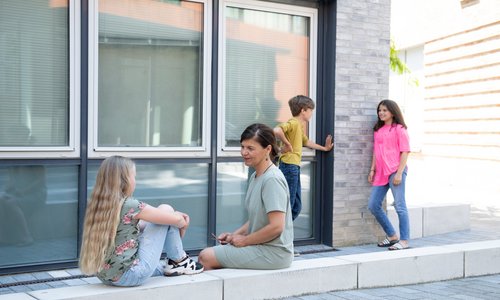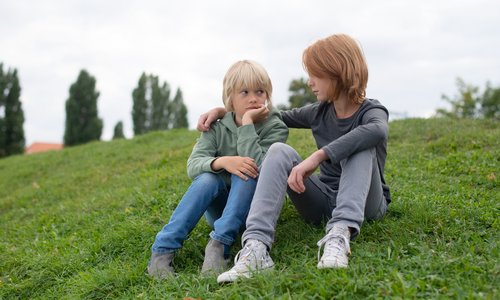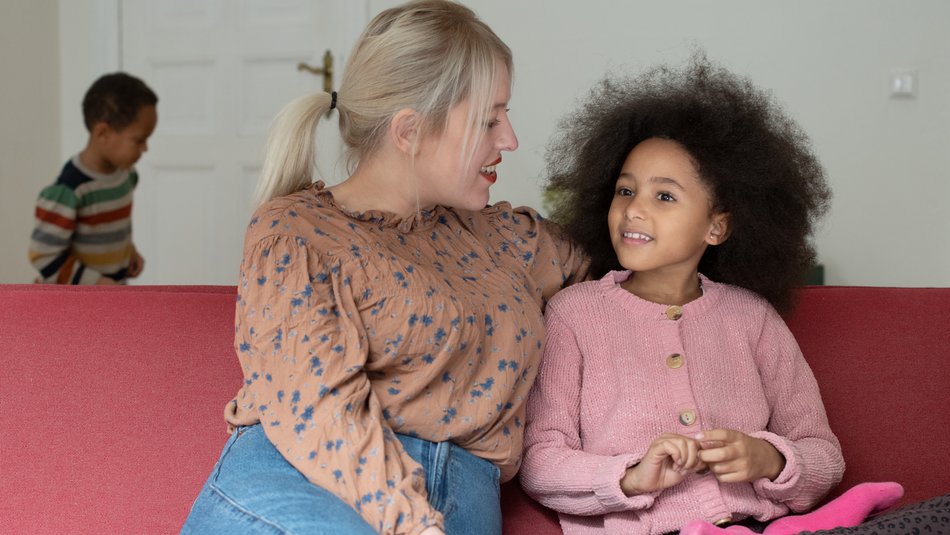
A preventive upbringing attitude both in the family as well as in educational institutions is an essential step towards protecting children and adolescents from sexual abuse. The challenges and opportunities for mothers and fathers, for grandparents and for everyone who lives and spends time with children all lie primarily in everyday upbringing. This is where prevention comes in.
Prevention starts in everyday life
In the family, a preventive upbringing means treating daughters and sons with love and respect, taking their personalities seriously and encouraging their self-determination capabilities. A preventive upbringing should be focused on strengthening children and adolescents. This works best when parents are sensitive to their concerns and do not subordinate the children’s needs to their own needs. Most importantly it is about encouraging them to be themselves without overstepping the boundaries of others.
In institutions with a pedagogical educational mandate, such as kindergartens, schools or homes, there are specific requirements involved in implementing a preventive educational attitude.
In institutions that do not have a pedagogical mandate in the narrower sense, such as children's clinics or speech therapy practices, it is less about pedagogical approach and more about forming relationships between adults and children or adolescents. These relationships are based on children's rights and are formed through attentiveness and respect.
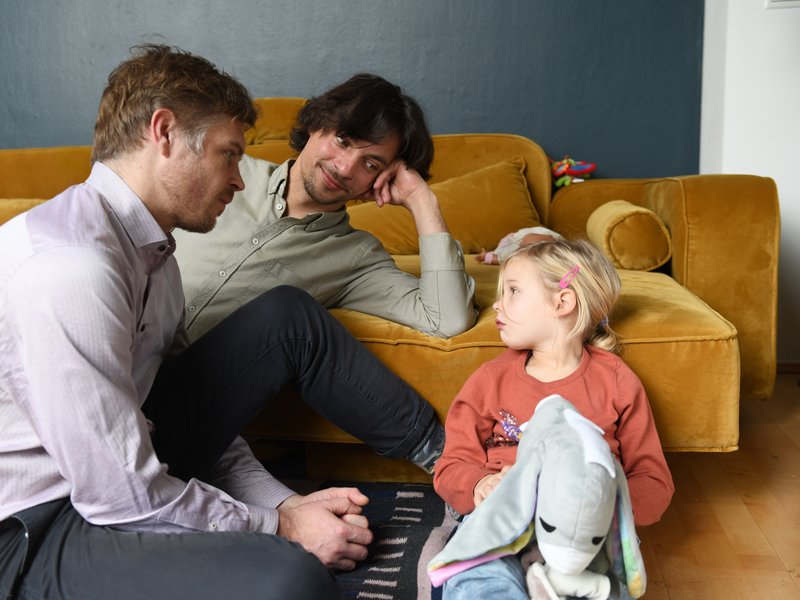
What are the prevention issues and how can they be incorporated?
For their own protection, children and adolescents in families and educational institutions need to be involved in talks in which they are told about sexuality, their own rights and the risks of sexual abuse as well as everyday experiences in which their personal boundaries are respected, their opinions are valued and their involvement is needed.These are the cornerstones of a preventive upbringing. It canreduce risks but cannot guarantee absolute protection. However, it can help to end abuse at an early stage before any serious psychological damage occurs. It can also provide better help in the event of psychological damage.
Self-determination over one‘s own body
Children and adolescents should see their own body as being beautiful, lovable and valuable to them and be allowed to discover and experience it. Disparaging remarks about the bodies of others should never be part of a conversation, neither in the family nor in an educational institution. The right to bodily self-determination needs both parents and specialists to encourage children and adolescents to make progress in their autonomy and to treat them respectfully and without inflicting violence upon themselves.
Girls and boys should know and experience that they can decide for themselves about experiencing their bodies and that others are simply not allowed to touch them without being asked - even if it is "just meant nicely".
Physical self-determination also includes the experience of being able to decide for yourself who takes a photo of you and in which situation.
Supporting sexual education
Children need adults to talk to them about sexuality and help them with their interest in sexual issues. Childish ignorance about sexuality can easily be exploited by perpetrators. It is also easier for girls and boys to talk about sexual assaults if they already know the terms for genitals and sexual processes. The responsibility for sexual education is shared between the family and the educational institutions.
If parents find it difficult to talk freely about sexual issues then schools can help and compensate for any knowledge deficits. Sexual education does not become superfluous because sexuality is omnipresent in our society. On the contrary: children and adolescents need orientation with regard to the jungle of sexual and sexualised messages and stimuli. In particular, they should understand the difference between sexuality and sexual violence from an early age. But it is also important for adolescents, who mainly try to sort out their sexual questions with others of the same age through direct conversations, in chats or through teen magazines, to know that they can - but do not have to - always turn to adult contacts. This knowledge will give them security, even if they hardly ever use it.
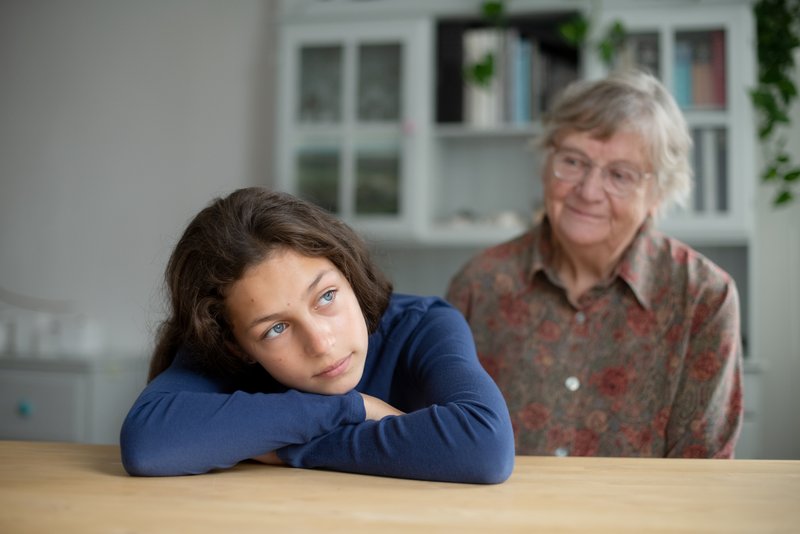
Talk about feelings and encourage self-confidence
Male and female perpetrators manipulate the feelings of those involved and promote the perception of their caregivers. Prevention also means promoting children's and adolescent’s ability to perceive and supporting them in expressing their feelings. They should learn that different perceptions and feelings about the same situations can exist within the family or a group.
It is equally important to encourage children and adolescents not to be persuaded to do things that they do not want to do. Girls and boys need encouragement when it comes to expressing feelings that supposedly do not fit their gender. Girls who are wild and self-confident and boys who are allowed to be fearful and helpless will all be better protected from abuse. The following also applies here: educators who talk about their own feelings and also express them authentically are important role models. Digital media also present parents as well as teachers with special challenges when it comes to feelings: They have to convey to children and adolescents that it is very easy to be deceived when using online communications. A perpetrator could also be hiding amongst supposed friends of the same age on the internet and gestures and facial expressions are also missing in chat rooms, which means that there are very few clues available for assessing the other person.
Being allowed to disagree: Adults are not always in the right
In order for children and adolescents to be able to express their discomfort and defence in cases of sexual assault or sexual abuse, they should learn from within their families as well as from supervising professionals that adults are not always in the right. Learning that their objection, i.e. their "no", is not simply ignored and that their voice is listened to, is very important. Those who are taken seriously are also better able to express their own opinions to other people or to express discontent and rejection. Some children or adolescents will need encouragement when it comes to saying no. However, they should not be overwhelmed with expectations, because saying no is a right, not an obligation. With other children and adolescents it is more important to encourage them to accept no and to respect the boundaries of others.
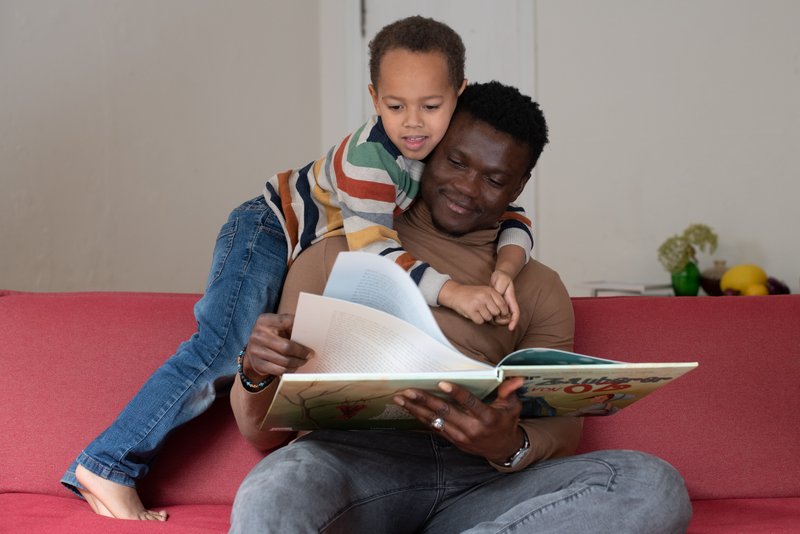
Avoid a culture of secrecy: Talking openly with each other
Parents should allow as few secrets as possible in family life so that a "culture of secrecy" does not evolve. Anyone who is used to keeping quiet about anything unpleasant will not be adequately prepared when a male or female perpetrator wants to enforce secrecy. Parents and specialists should teach children at an early age that they are allowed to talk about "bad" secrets, that is, secrets that make them feel bad! This is not being a tell-tale nor is it betrayal! This message is also important for older children and adolescents. A particular risk exists, especially in established educational and care institutions, that girls and boys who suffer sexual violence will remain silent because they dare not damage the institution's reputation or violate the "honour of their group".
Maintain a trusting relationship
In order for children or adolescents to be able to confide in someone when they are being abused, they need to know that their parents, other private caregivers as well as any specialists involved are interested in them and their worries and needs. Parents should make it clear that the family is not a closed system and other people can also be suitable confidants. It is of utmost importance that girls and boys learn that their personal burdens are not being ignored but are actually being listened to. Knowing that caregivers are familiar with the sexual abuse issue and that they also know ways to get help will increase the likelihood that they will confide their burdens in someone.
The blame never lies with those who have suffered
Girls and boys who have suffered sexual violence are never to blame. This should be clearly explained to children and adolescents. Most children or adolescents feel guilty when it comes to sexual abuse, a situation that is massively encouraged and exploited by the perpetrators. This is because they rely on the loyalty of the children and adolescents who suffered the abuse, especially as they know that those who suffered will feel that they are (co)-responsible for what happened. This is especially easy to achieve if children or adolescents have taken risks and endangered themselves, e.g. through uploading offensive self-presentations on social networks. Prevention should not be limited to warning against this behaviour. It must also make it very clear that even risky behaviour does not establish any form of guilt.
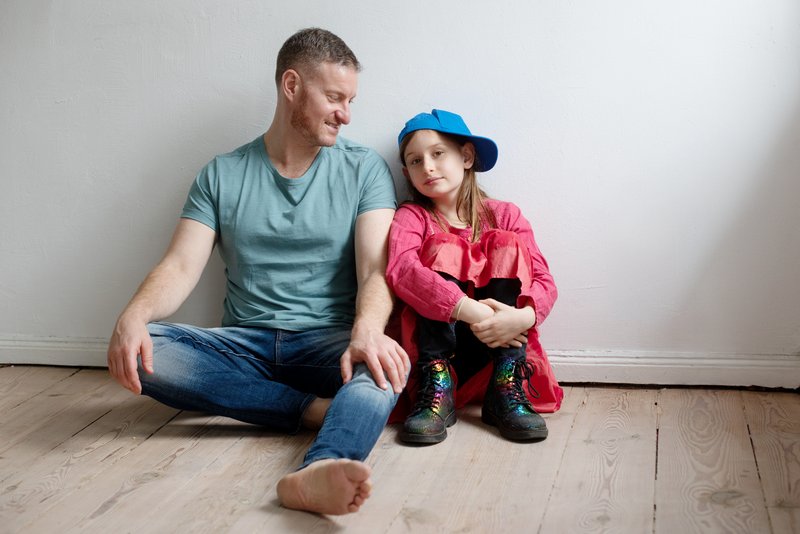
Talk to children and adolescents about abuse
Education about sexual abuse provides important protection for children from school age onwards. Informed children and adolescents are better able to assess situations, be less guileless and more likely to talk about it. Giving younger children specific information about abuse is usually inappropriate because this issue can easily trigger fear. Only in exceptional cases such as when children directly ask about it or have overheard confusing information, is it useful to talk in a few unexcited sentences about the fact that there are some people who want to touch children in the genital area or kiss them intensively. The emphasis here should be on the wrongness of this action.
Many parents and educational professionals are afraid to talk about abuse because they think that they do not have the right words to describe it. But you don't have to do everything right. The most important thing in such talks is that children and young people experience: my mother, my father, my teacher or my carer all know that something like this exists. This also means that: I can go to any of these confidants if something like this happens to me.
The important information that can be clarified during the talk is:
- Sexual violence can happen to boys as well as girls.
- Perpetrators are mainly male and adult, but women or adolescents can also become perpetrators.
- The majority of adults and adolescents do not abuse others.
- Male and female perpetrators do not show their intentions.
- Male or female perpetrators are often well-known and familiar people and rarely are they strangers.
- Sexual abuse has nothing to do with love.
- Abuse often begins with strange feelings.
- Sexual violence can also occur in chat rooms and on social networks.
- Sexual assaults can also occur between children and adolescents.
Talking about sexual abuse should not create fear in girls and boys and shoul avoid the impression that abuse destroys the future. Rather, it would be better to explain that abuse can have a severe effect on those who suffer it, but it can be dealt with through solace, support and, if necessary, therapy.
Providing prevention
Educational institutions such as schools and day-care centres have a special duty to protect children. They can contribute to protecting girls and boys entrusted to their care by providing specific preventive measures. They can also use offers from external organisations or specialised agencies as well as their own projects that should be prepared and implemented using suitable supporting materials.
When deciding on using an external offer, an initial assessment must be made to decide whether it is both qualified and professional and can be carried out with realistic aims? Quality criteria, such as those published by “Aktion Jugendschutz, Nordrhein-Westfalen”, will be helpful here. The “School Prevention” portal provides an overview of projects from external providers.
Prevention materials that are suitable for your own work with children or adolescents can be found in a database that can be used through the “School Prevention” portal. A reflection sheet is also provided for evaluating the quality and suitability.


